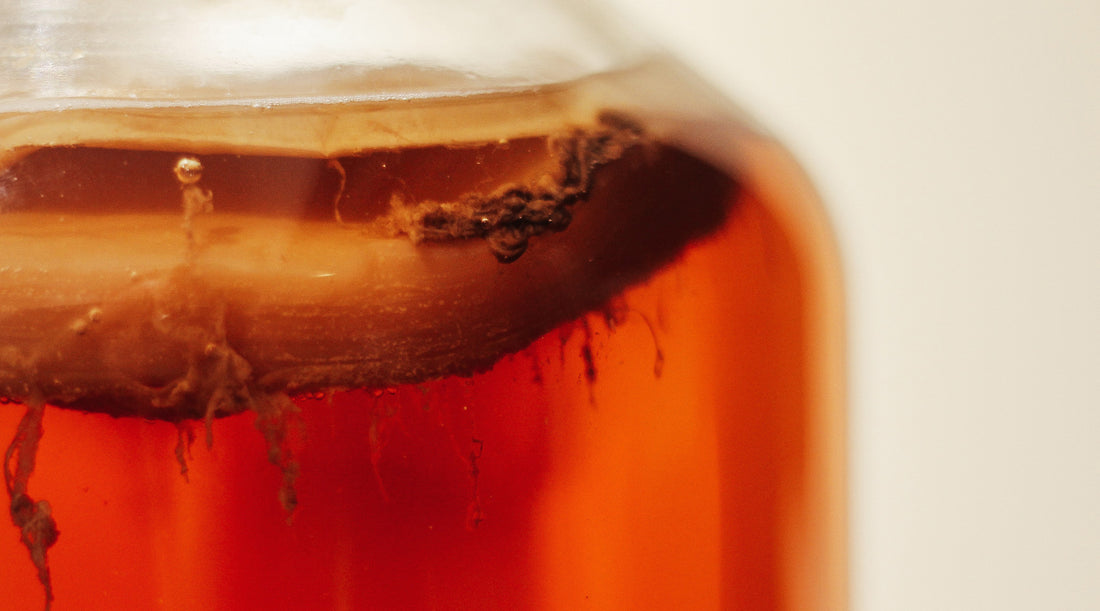What do you call a kombucha novice? No, this isn't a joke. There is no punchline. We've all been there and experienced that very first sip, accompanied by an anticipation that tinges on a mild form of fear. After all, how could something so tasty come from something so weird-looking?
Whatever you call them (I'm going for booch beginners), there's a guaranteed pre-sup question – one that surfaces time and again: "what does kombucha taste like?" Naturally, the best way to find out is to drink a bottle, as describing that one-of-a-kind flavour is pretty difficult. Try describing a beer to someone that has never tasted one before. It's not easy! I'm always open for a challenge, though, so here goes.
What does Kombucha taste like?
It's best to start with a bit of background. Kombucha is a combined yeast and bacterial fermentation of sweet tea. What does that mean? Well, the yeast part you'll have experienced in beer or wine. Yeast converts the sugars in the brew to alcohol and you get a rich yeasty, musty flavour. If we just put yeast in our sweet tea we would make a tea beer, and (if I'm honest) that in itself would taste pretty good as well.
But kombucha doesn't stop at beer. The healthy bacteria then take over and begin to eat up most of the alcohol (and some more of the sugar) and convert it into beneficial acids.
This is pretty much like the vinegar making process except that, in kombucha, there is a mix of acids that are much softer than the acetic acid in vinegar. So with a good kombucha, you get a good bite without the pucker face.
On top of all that there is the effect of the tea itself. Most kombucha brands use a fairly basic tea to brew their base or 'original' kombucha. However, at Real Kombucha we use very special hand-picked fine teas, chosen specifically for their rich individual characters. So the flavour of each of the resulting Real Kombucha tastes is very dependent upon the tea we use.
How do we characterise them?
Black Tea Kombucha
Black teas tend to produce a flavour that is very close to a light dry cider: rich, full of fruity and apply flavours with a good acidic bite. Real Kombucha's Smoke House (now discontinued) is made from Yunnan black teas, which in addition have a lovely smokey, caramelly and malty undertone.
White Tea Kombucha
White teas are light, fresh and very delicate. Consequently, white tea kombuchas tend to be light and aromatic, with almond and vanilla flavours. Real Kombucha's Royal Flush is not strictly a white tea, but is brewed from a delicate and very aromatic hand-picked first flush Darjeeling which has a character very close to a white tea. It gives us a kombucha that is close to, but lighter than a sparkling wine like a Chardonnay or Sauvignon Blanc.
Green Tea Kombucha
Fine green teas, when brewed well, can produce a very delicate kombucha with flavours of grass and lemon. Green teas are the closest to a soft drink. Real Kombucha's Dry Dragon is brewed from Dragonwell green tea – richer and more leafy than most green teas, which brings out some more complex flavours.
Don't take my word for any of this, of course. I'll never be able to adequately describe the pleasure of downing a bottle of Dry Dragon after a great bike ride, sipping on a Royal Flush before dinner, or quoffing a Smoke House on a warm evening in a beer garden with friends. What does kombucha taste like? Get stuck in and find out for yourself.

